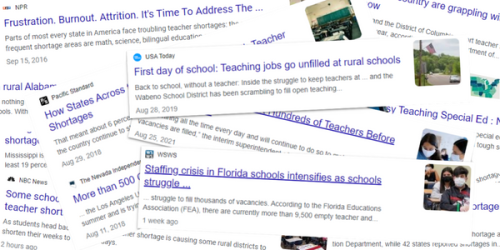Many districts across the country are facing subject-specific teacher shortages. Key to addressing this challenge is teacher retention—after all, the more teachers stay, the less districts need to hire and train new ones. While good working conditions play a role, new research confirms that compensation also matters—especially for certain positions.
Special education teachers in particular are in critical demand. Nearly every state has identified special education as a shortage area, highlighting the need for teachers with specialized skills.
A working paper from researchers at the University of California, Irvine; University of Missouri; and Vanderbilt University found that a 10% increase in base pay for special education teachers reduces turnover by four percentage points—more than double the impact of the same pay raise for general education teachers.
What does this mean for districts? Take the School District of Philadelphia (SDP) as an example.1 The district serves over 100,000 students and in 2023 employed 1,293 special education teachers. The turnover rate for special education teachers in SDP was 16.1% from SY2023 to SY2024, aligning with the national average (according to NCES).
At that rate, the district had to replace 208 special education teachers in 2024 alone. A 10% salary increase for special education teachers could have reduced turnover from 16% to 12%, lowering the number of teachers needing replacement by 53 positions. Lower turnover not only cuts hiring costs but also benefits student outcomes, as research shows high turnover negatively affects achievement.2
While a 10% pay raise for special education teachers comes with a steep cost, turnover also carries a heavy price tag (estimated at about $24,000 per teacher) and harms student learning and school stability.
The study also found that early- and late-career teachers (rather than those in the middle of their careers) were most influenced by salary increases when deciding whether to remain in the classroom. This is likely because those teachers typically see lower rates of salary growth year over year due to contract structures. Research also showed that there was no statistically significant difference in retention between teachers with bachelor’s and master’s degrees when salary increases were put in place.
What can states and districts learn from this study?
- Provide at least a 10% increase in base pay for special education teachers to increase retention.
- Consider whether salary increases would be offset by (or cheaper than) the cost of recruiting and hiring new teachers.
- Review your pay structure for early- and late-career teachers. If the growth rate of salaries is low, raise base pay for those groups to increase teacher retention.
More like this

How are school districts using strategic pay to attract and retain teachers where they need them?

Strategies to build a sustainable special education teacher workforce

More districts are paying teachers strategically to meet critical needs. Is yours?
Endnotes
- SDP’s teacher-by-year data is publicly available from the Pennsylvania Department of Education. Analysis is limited to full-time, fully licensed classroom teachers with a primary teaching assignment of “Special Ed, Resource PreK-12.” https://www.pa.gov/agencies/education/data-and-reporting/school-staff/professional-and-support-personnel.html#accordion-945bbf16e1-item-a76e74f49e
- Ronfeldt, M., Loeb, S., & Wyckoff, J. (2013). How teacher turnover harms student achievement. American Educational Research Journal, 50(1), 4–36. https://doi.org/10.3102/0002831212463813


